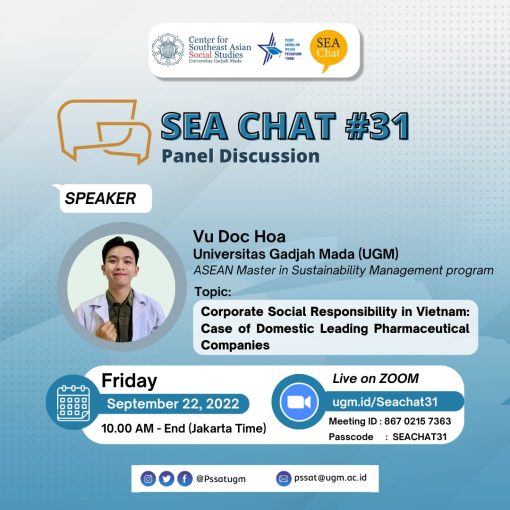
On Wednesday (09/22), the Center for Southeast Asian Social Studies Universitas Gadjah Mada (CESASS UGM) continued to hold the Southeast Asian Chat (SEA Chat), a discussion agenda that talks about social issues happening around Southeast Asia. As for the speaker, this 31st SEA Chat invited Vu Duc Hoa, an ASEAN Master in Sustainability Management Program student from UGM. On this occasion, Hoa presented his research, titled “Corporate Social Responsibility in Vietnam: Case of Domestic Leading Pharmaceutical Companies.”
Hoa started his presentation by explaining Corporate Social Responsibility (CSR) as a fundamental commitment for companies to give back and contribute to society for good. He stated that CSR is important in Vietnam, because it is one of 17 countries with the highest growth of pharmaceutical industries, simply known as pharmerging countries. In this research, Hoa picked out 8 of 180 pharmaceutical companies in Vietnam as samples to analyze the CSR performance. He implemented the four pillars in CSR to conduct the research: Economic Responsibility, Legal Responsibility, Ethical Responsibility, and Philanthropic Responsibility.
From the economic responsibility pillar, the result shows that these companies have ensured revenue and profits around 588,550,000 net in 2021, also created sustainable jobs with totals of 9,000 employees. Next, Hoa explained his findings that Vietnam has not provided any complete CSR laws to be a solid legal basis, so the company just adopted the laws and taxes related to the environmental area. On the ethical responsibility pillar, 8 companies in Vietnam adopted traditions from three doctrines: Confucianism, Taoism, and Buddhism, because those three are the most popular doctrines in Vietnam. Lastly, the pharmaceutical companies have fulfilled philanthropic responsibility, especially protecting the environment by adopting both Vietnam standards and ISO standards.
At the end of his presentation, Hoa concluded that the implementation of CSR in Vietnam is still in the early stages, considering Vietnam still doesn’t have a specific standard about the CSR laws. Thus, each company used their own way to implement the rules, which led them failing to meet the requirements on CSR. He also proclaims that the companies which don’t pay attention and perform the proper CSR and other social responsibility may lose their access to the market because of the consumers, policy makers, investors, and NGOs’ awareness of this policy.
SEA Chat #31 ended after a question and answer session, which was filled with discussions between speakers and participants about research. CSR as a form of social contribution is one of the mandates that are sometimes forgotten by companies, especially the fact that there are only few people who really understand CSR and its practices. In fact, companies and factories are giant subjects that often bring harm to the society and the surrounding environment. This discussion is expected to raise awareness and concern for society on the implementation of CSR in the surrounding environment.
